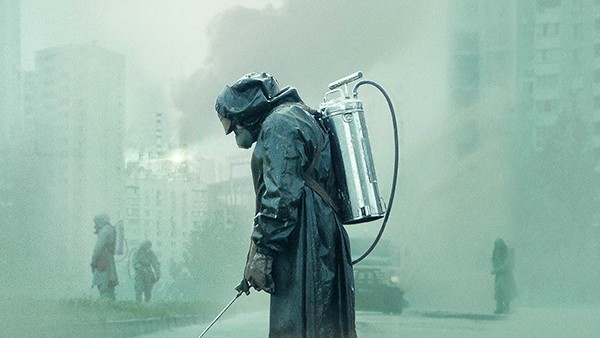Proving that everything’s coming up ’80s in 2019, the most relevant show on television right now is HBO’s Chernobyl. The number four reactor at the Vladimir Ilyich Lenin nuclear power plant exploded on April 26, 1986, releasing as much radiation as a smallish nuclear war. The environmental catastrophe that followed killed thousands and rendered roughly 1,000 square miles uninhabitable by humans for the foreseeable future. But it was almost much, much worse.
Created by writer/producer Craig Mazin, Chernobyl tells the story of the epic disaster in five episodes. Mazin combed through the official Soviet histories for the big-picture details, but many of the individual incidents depicted came from Voices from Chernobyl by Nobel Prize-winning author Svetlana Alexievich.
The first episode, “1:23:45,” begins with the suicide of Dr. Valery Legasov (Jared Harris), the nuclear physicist in charge of first containing and then investigating the accident. Before he hangs himself, he leaves behind a suicide note that states in no uncertain terms who was at fault for the accident.

One of the reasons Chernobyl is so successful is its intricate structure. Legasov’s final act sets the tone for the rest of the show, where the act of telling vital truths is punished again and again. The story of the worst nuclear disaster in the history of humankind is a huge, sprawling tale involving tens of thousands of people, each with their own motives, biases, responsibilities, and handicaps. This is the sort of story the early Soviet filmmakers, such as Sergei Eisenstein, excelled in telling; there’s more than a little bit of Battleship Potemkin‘s DNA in Mazin’s scripts.
When Mazin and director Johan Renck flash back, it’s not to the very beginning, but instead to the big bang. The interior of the nuclear power plant’s control room shakes violently, and everyone wonders what happened. Anatoly Dyatlov (Paul Ritter), the director on duty of the night shift, doesn’t panic so much as get annoyed. It’s clear that his chief concern is not assessing the situation and containing the damage, but how he’s going to explain this screw-up to the higher-ups. All he can think of to do is just throw some more water on the reactor while recriminations fly among the staff. He refuses to accept that the pumps he needs to move the water have ceased to exist. The most affecting scene in the show’s early going is when Dyatlov orders control room engineer Sitnikov (Jamie Sives) to check the state of the reactor “with your own eyes” long after it’s clear to everyone in the room that it has exploded and is currently on fire. He proceeds across the blasted catwalk at gunpoint like a man forced to walk the plank. The next episode, we see the skin sloughing off his face.
People being catastrophically unable to fit what they see with their own eyes into their blinkered worldview is another recurring theme in Chernobyl. The reactor wasn’t supposed to be able to explode, so when it clearly did explode, no one could comprehend it, so crucial time was lost, and people got killed. The most tragic story of this series, which is nothing but a collection of tragic stories, belongs to firefighter Vasily Ignatenko (Adam Negaitis). The dashing young man is among the first responders on the scene, where he sees his comrades drop like flies under the intense radiation bombardment. His young wife Lyudmilla (Jessie Buckley) moves heaven and earth to be by his side, only to find her actions have doomed their unborn child. (Alexievich, who uncovered this story in her book, described Lyudmilla’s testimony as “Shakespearean.”)
Renck’s recreation of the decaying Soviet state is a stunningly realistic mural of decaying infrastructure and bad haircuts. The cliffhanger that bridges episode 2, “Please Remain Calm,” and episode 3, “Open Wide, O Earth,” where the entire fate of eastern Eurasia depends on whether or not three doomed volunteers crawling under the blazing reactor can unclog a drain, outdoes any of the year’s horror movies in terms of sheer tension. After that, the series turns into a whodunit, and we learn the series of errors that transpired before the story started.
Ultimately, the reason Chernobyl has hit a nerve in 2019 America is the creeping sense of dread it evokes. Though unmistakably set in the totalitarian communist environment of the Soviet Union, the parallels to our late-stage capitalist moment are obvious: those in power looking past looming environmental disaster because acting to prevent it might threaten their social status; scientists and educated experts ignored in favor of political expediency; and, most dangerous of all, a political culture that prefers leader-flattering lies over hard truths. Like those who lost Chernobyl, we have the knowledge and means to prevent catastrophe but lack the political will.
Chernobyl
Available to stream on HBO